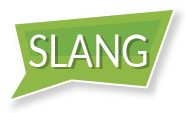 I don’t know about you, but whenever I see an acronym I don’t understand (oftentimes on domain forums and Twitter), I type it into Google to see what it means. More often than not, one of the first three search result is a page from Urban Dictionary, and they do a pretty solid job of giving me the definitions of popular and even some less used acronyms and slang terms.
I don’t know about you, but whenever I see an acronym I don’t understand (oftentimes on domain forums and Twitter), I type it into Google to see what it means. More often than not, one of the first three search result is a page from Urban Dictionary, and they do a pretty solid job of giving me the definitions of popular and even some less used acronyms and slang terms.
Andrew Rosener of Media Options emailed me to let me know his company recently launched a website on Slang.org, a domain name he acquired in April of this year. The website is more of a search engine play, and the company intends to compete directly with Urban Dictionary and InternetSlang.com. The company has spent quite a bit of money on research and development, and that should help pay dividends.
According to Andrew, “we expect to have tens of thousands of indexed pages in Google within 6-12 months, and our objective is to become a top 25,000 Alexa rank website.” He is looking to become “a go to source for urban slang and acronym lookups.”
Although Slang.org has been seeded with thousands of slang terms, sayings, and acronyms, the website is going to rely on visitor contributions to help generate additional content. People are able to suggest new terms as well as share terms they find useful or humorous through various social media channels.
In case you are curious, Digimedia owns Slang.com, and it will be interesting to see if the launch of Slang.org has an impact on the traffic to Slang.com.


Not a fan of the .org, I know it works in certain situations, the price of the .com just went up… but it could have a twist for some good ad revenue
I don’t love .org either.
I’ll check back in a few months and will keep an eye out for it in search rankings.
Seems like a strange market to jump into. How does Urban Dictionary drive revenue? I see very few ads on their site. They have a hell of a social media following, maybe there’s more advertising opportunities in that than anything.
Just visited slang.org. First impression, not as visually pleasing as Urban Dictionary, and way too much going on.
It seems to be a search engine play, which means the internal pages are more important than the home page (visually). I actually like the layout: http://slang.org/OBS-meaning-definition
I think the Adsense CTR will obviously be key. Not sure what type of RPM one would expect to achieve with a site in this space, but I am sure Andrew did his homework.
Urban Dictionary drives revenue with $3 and $4 CPM ad rates. They do 80M impressions a month!
http://ads.urbandictionary.com/
Plus, it’s very lean company mainly run by the original owner.
I guess Andrew figures he can still make $$ being #2 with all the long-tail keywords. Because there is absolutely no chance of overtaking Urban Dictionary with it’s 15 yrs of trust in Google.
Wow, OK didn’t realize that. Enough said.
You don’t have to be #1 to make good money. You can be #2 or 3 and still do well, especially if there is high search volume.
He should’ve bought sayings.com 😀
I already sold that one 🙂
Low cost to setup, especially if he did the website himself. Easy, simple. Low risk… Good for him.
I think it works fine on the .org, good luck to the chap.